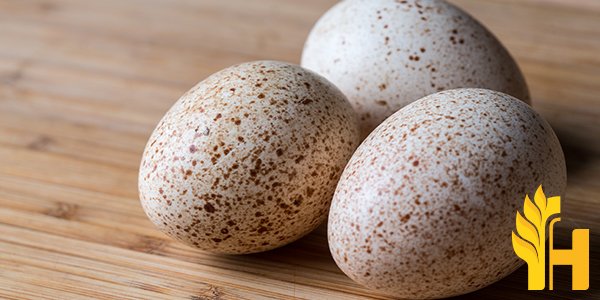Turkey Egg price

Where to buy and sell Turkey Egg, lowest (cheapest) and highest price.
check offers buy sell Turkey EggToday price for Turkey EggTurkey Egg wholesale prices 2022
The Current commodity price of Turkey Egg per kg, pound in the world in the global markets
Turkey Egg
The white turkey egg is large (the size of a jumbo chicken egg) and has brown speckles. It weighs approximately 80 to 90 grams which are 1 & ½ times more than that of a large chicken egg. White turkeys are bred for laying eggs, not meat production, therefore the female's reproductive cycle lasts only about one year, compared to a larger 10-year cycle of the native North American wild turkey. For a female white turkey to continue reproducing, she must be artificially inseminated each year. White turkeys can lay up to 250 eggs per year and have been genetically modified by selective breeding for this trait – they will lay their first egg at about 16-20 weeks of age, and will lay their full capacity of eggs by 20-24 months of age. Brown or bronze-colored hens are also available; according to the US Department of Agriculture (USDA), these birds produce brown eggs. The white turkey egg color is due to an absence in the bile pigment biliverdin, not unlike the blue color in blue chicken eggs, which by contrast are laid by a breed of South American chicken. The USDA says that white turkey eggs are more heat resistant than brown chicken eggs because they have fewer pores. White turkey egg color is determined by sex . Hens lay white or cream-colored eggs, to contrast with the brown or bronze color of most males. Since most female turkeys are artificially inseminated, their eggs come white regardless of whether a male is present to fertilize them. The shell membrane and whites (albumen) of turkey eggs consist primarily of albumen protein. The yolk makes up around 33% of the contents of the egg and contains high-quality protein, minerals, vitamins, fat, cholesterol, and pigments (such as xanthophylls ). Although turkey eggs are larger than chicken eggs, they are proportionally smaller in size concerning their other dimensions. A turkey egg has around 8500 pores on its surface; whereas a chicken egg has around 17,250 pores. The U.S. Department of Agriculture grades eggs by the interior quality and the appearance and condition of the eggshell. Eggs of any quality grade may differ in weight (size). US Grade AA eggs have firm whites and clean, unbroken shells; Grade A eggs have slight cracks in the shell, clean, unbroken shells; Grade B eggs have broken shells and the contents are not discolored or otherwise defective.Global turkey egg production
Turkey's egg production has continued to increase in recent years, reaching a total of over 4.5 million tons in 2016. This is an increase of nearly 2% from the previous year. The majority of turkey eggs are produced in Europe and North America, with these two regions accounting for over 70% of global production. Asia is the third largest producer of turkey eggs, with China and India being the leading producers in the region. Turkey's egg production has continued to increase in recent years due to a number of factors. One of the main reasons for this is the growing demand for turkey meat around the world. As more people learn about the health benefits of turkey meat, they are increasingly choosing to include it in their diets. In addition, the expansion of the turkey industry into new markets has also contributed to the growth in egg production. With more people being exposed to turkey products, there is a greater demand for these items. The increased production of turkey eggs has also been boosted by improvements in technology and husbandry practices. The use of more efficient incubators and better feeding methods has helped to increase the overall hatchability of eggs. This, in turn, has led to more turkeys being born each year, which has further boosted production levels. Looking to the future, it is expected that turkey egg production will continue to grow at a steady pace. This growth is likely to be driven by the continued demand for turkey meat around the world. Additionally, as more countries become exposed to turkey products, the demand is likely to increase even further. This will ensure that turkey eggs remain an important part of the global poultry industry.Download our new
Husfarm App
Stay up to date with the current prieces of agricultural products all over the world.
Do you want to sell agricultural products?
Are you an Agricultural processor looking for high-quality products to buy?
Post an ad for FREE!
